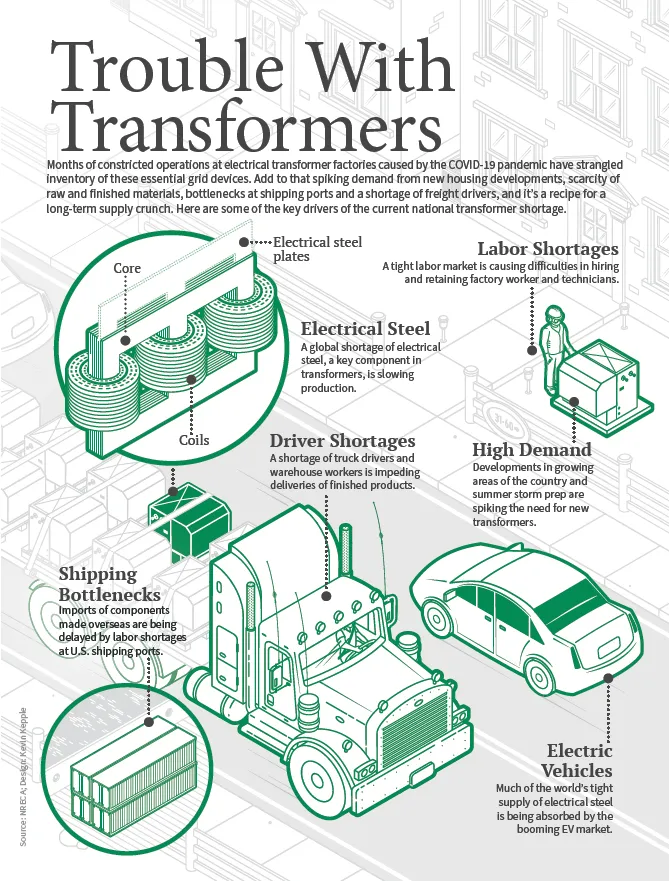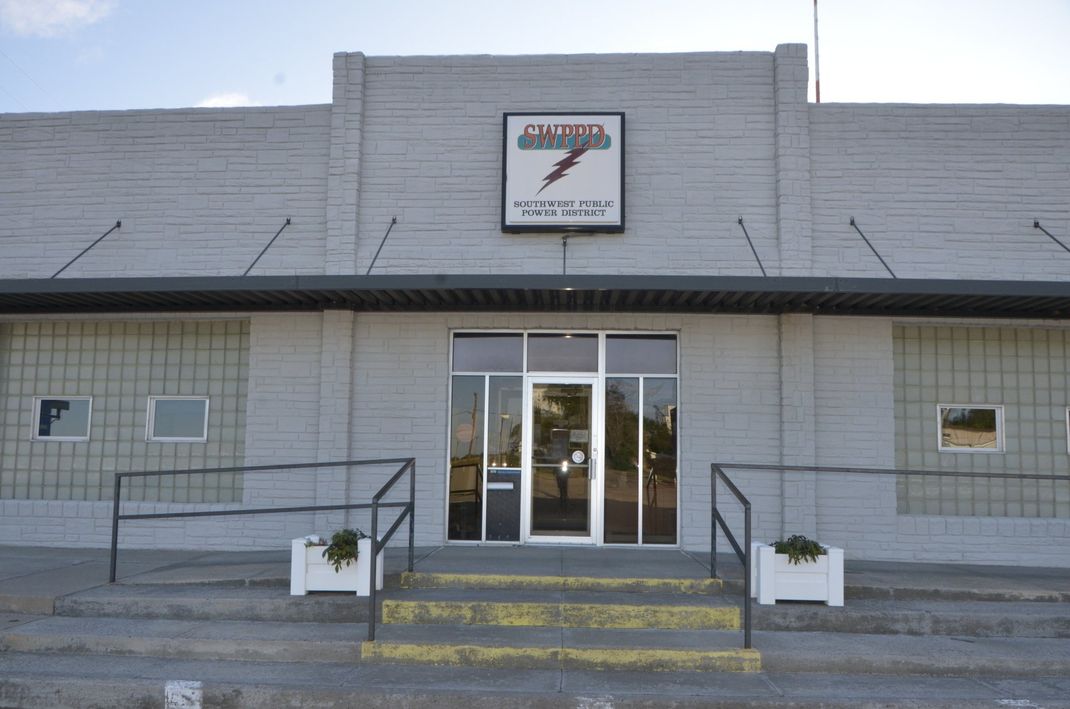Welcome to SWPPD
Located in Palisade serving five counties in Southwest Nebraska including: Chase, Dundy, Hayes, Hitchcock, and Red Willow. Servicing 2,585 miles of line, 6,452 meters, and over 109,000 Horsepower of irrigation load.
Learn More
Helpful Links
Load Management >
Business disputes are part of every business. We help you protect your best interests.
Load Management
We provide employers with practical and strategic advice and guidance.
Local Weather
Draw upon our full complement of services to safeguard and manage your assets.
Power Outages
Latest News
Our main concern is servicing you to the best of our ability and being part of this great community. Here we will keep you informed about current news and things happening at SWPPD including widespread outage situations.
Journeyman or Apprentice Lineman Position
Southwest Public Power District located in southwest Nebraska, has an opening for the position of System Engineer. The System Engineer is responsible for recommending, planning and overseeing engineering projects, maintaining the District’s electric distribution models and assisting the operations department by providing technical support. This position will oversee all aspects of the engineering requirements and implement current and future technologies to ensure a safe, reliable and efficient electric distribution system. SWPPD’s operating hours are compressed work schedule with every other Friday off. A bachelor’s degree in electrical engineering or electrical engineering technology is required. In lieu of a degree, a minimum of 5 years of experience in an engineering position at an electric utility may be considered. An effective working knowledge of electrical distribution system operations is required. A valid Nebraska driver’s license and passing a pre-employment drug and alcohol test is required. Southwest Public Power District offers an excellent wage and benefit package, including paid vacation, sick leave, paid health insurance, and funded retirement plans. Southwest Public Power District is an equal opportunity employer and is headquartered in Palisade, Nebraska. The region’s schools, small communities, and recreational opportunities make it a great place to live and raise a family. Qualified candidates should submit a letter of interest, resume and references to Gary Hanken, System Engineer – jobs@swppd.com. Position will be open until filled.
Effective January 1, 2025, Southwest Public Power District will implement an overall 2.4% rate increase to the customers of the District. During the Southwest Public Power District board meeting held on November 20th, 2024, management with help from a third-party rate consultant, presented to the Board of Directors a current Cost of Service study. The Board of Directors reviewed the study and approved the new retail rates as recommended by management. Over the past 12 years, SWPPD customers have received safe and reliable electricity without experiencing an overall annual customer rate increase in energy usage. In fact, since 2019, a Power Cost Adjustment (PCA) credit has been passed through from our energy provider making kilowatt hour (kWh) rates even cheaper than they were twelve years ago. Aside from a customer charge increase on single phase service in 2022, this will be the first increase in kWh usage since 2013. Over this same period of time, inflation has risen by 33% with the majority of these increases coming in the past 4 years. Since 2022, we have seen an increase of between 30% to more than 100% in the costs of material items such as wire and transformers. We are also forced to keep more material on hand since it is taking longer to acquire those materials. These increases are the driving force that continues to pressure the District to maintain our financial integrity while at the same time, supporting the necessary maintenance and upgrades of the electric plant. Some projects have even been delayed in an effort to reduce costs, but that is proving to be only a short-term fix. A recent study from Cooperative Electric Energy Utility Supply Inc (CEEUS) shows that over the last 4 years, transformers are 99% more expensive today. Conductor has increased 62% while crossarms and poles cost over 103% more today. . Southwest Public Power District has been able to cope with rising inflation and expenses while still maintaining rates well below the national average. This has been accomplished by an extremely good working relationship between the employees of SWPPD and the Board of Directors keeping well informed and making sound educated business decisions in an effort to maintain the primary purpose for the establishment of SWPPD: to bring safe-dependable-affordable power to our customers. Although no one likes to see the cost of their utilities increase, it is crucial for SWPPD to continue to meet our financial goals and provide you with safe and reliable electricity. The new rates can be viewed on our website at www.swppd.com/rates-payment. If you have any questions, please do not hesitate to contact us at (308)285-3295.

Southwest Public Power District is proud to announce the Frank & Betty Potthoff Memorial Scholarship Program! Frank and Betty Potthoff were both formerly employed by SWPPD, and the Potthoff family has generously offered to fund this scholarship as a memorial to them. This $500 per semester scholarship will help a student attend the Utility Line Program at either Northeast Community College or Western Nebraska Community College. To qualify for the scholarship students must be a high school senior or graduate and reside in the border territory generally served by SWPPD and all towns therein. The applicant must have already applied to be admitted to the Utility Line Program at either college and have been accepted or placed on a waiting list. To apply for the scholarship, the student must submit a personal essay to SWPPD not more than 350 words in length explaining why they are interested in the Utility Line Program as their course of study. They must also provide their class rank and GPA. If the applicant has graduated high school and is attending college, they must submit college transcripts with their essay. Applicant essays will be forwarded to a selection committee. SWPPD would like to award the first scholarship for the Fall semester of 2023. Applicants must have their essays submitted by May 31, 2023 in order to be eligible. Please contact Frank Bonini at (308)285-3295, or frankb@swppd.com, with questions.

As the country continues to recover from the many recent global and national events, the supply chain issues are going to remain a challenge for at least the next 12 to 24 months. The inventory SWPPD requires to build and maintain new and existing services has been strained. Today, the current order lead time for transformers used in our industry are estimated to be approximately 52 weeks out. Unfortunately, transformers are not the only inventory item of concern. Everything from the raw materials used in our conductor wire to the poles, cross-arms and bolts used in construction have been impacted. The trade associations and organizations we belong to have been proactive in working with the federal government and with manufacturers to make sure we have what we need to serve our customers. SWPPD has adapted by ordering supplies further in advance and in larger quantities when the manufacturer allows. We also continue to recycle and reuse materials where possible. Materials ordered by SWPPD are also subject to change based on several unexpected events such as national and local storm restoration needs, transportation costs and availability, raw material interruptions and many other possible unexpected scenarios. These circumstances have been substantial enough that we can no longer guarantee that new services will be completed prior to the summer of 2023. More specifically, no new irrigation service requests that are not already in our que will be built before the summer of 2023. Therefore, any new service requests for the rest of the year will be put on a waiting list on a “first come, first serve” basis. The Board and Management at SWPPD felt strongly that it was better to communicate this delay to our customers as far in advance as possible to make the necessary adjustments in your plans if you are considering a new service in 2023. We apologize for any inconvenience. Please reach out to SWPPD if you have any questions.
EnergyWise℠ Tips
Saving energy is something we all strive to do. Here we have a complete blog dedicated to energywise tips regarding the electric industry.
By: Energy Efficiency Program Manager Cory Fuehrer These days, instead of hearing a local dairy farmer hollering “Bessie,” you’re more likely to hear one of Nebraska’s public power utilities refer to “BESS” when discussing reliability. Rather than a seasoned Holstein cow, however, they are talking about a Battery Energy Storage System (BESS). This is one of the recent technologies Nebraska’s public power utilities consider for efficiently meeting the ever-growing electricity demand in our state. The Nebraska Power Association forecasts that our state’s average annual peak demand for electricity will continue to compound by 1.5% each year through 2042. This will be driven by both, new businesses drawn to our affordable, reliable power, and existing businesses expanding due to Nebraska’s favorable economic conditions. New loads will include ag and food processing, ethanol and ammonia production, data centers, irrigation conversions and other manufacturing to name a few. A number of electric utilities are adding new energy resources and some are considering the efficiencies a BESS could provide. In simple terms, a BESS is a BIG rechargeable battery. Though they may use different technologies such as sodium-sulfur and nickel-cadmium, the most common is lithium-ion. Storage systems are typically housed in engineered shipping containers, outdoor-rated cabinets, or purpose-built buildings placed on top of ground mounting structures using large cranes. They can be placed directly inside city centers or manufacturing areas, which reduces transmission costs and line losses without adding to urban air pollution. Without energy storage, electricity must be produced at the exact same time it is used. When demand for electricity spikes, most traditional generation resources require considerable time to bring online. The U.S. Energy Information Administration estimates only 25% of U.S. power plants can go from being fully shut down to fully operational in less than one hour. However, BESSs can supply their stored electricity in a matter of seconds. Having excess energy readily available can reduce or eliminate brownouts and blackouts during times of peak demand or extreme weather events. BESSs are also ideally paired with renewable generation resources like wind and solar. These resources are often not able to operate when power is needed most. Other times, they are available for output, but the immediate demand for electricity doesn’t exist. BESSs capture generation when it’s available, storing it and discharging it into the grid when and where it’s needed. Finally, BESSs help utilities manage the impact of price fluctuations for electricity in the wholesale market. During critical peak periods, the cost for electricity can increase more than one hundred-fold. BESSs allow utilities to provide energy during those brief periods and avoid purchasing energy at those extreme levels. Your local utility, in partnership with Nebraska Public Power District, wants to keep their costs low so that your own costs are as affordable as possible. By efficiently using their generation resources, utilities ensure you are able to purchase low-cost, sustainable electricity for years to come. If you would like ideas on how you can maximize use of that electricity, contact your local utility or visit www.energywisenebraska.com. EnergyWiseSM incentives are available to reduce the cost of many efficiency improvements.
We Value Your Opinion
Southwest Public Power District is committed to providing the best possible customer service. We value input from our customers and invite you to use the Contact Us form to share your comments, concerns, questions and suggestions. Compliments are accepted as well! Rest assured that all correspondence will be reviewed and handled with professional confidence and courtesy.
Send A Comment
Board of Directors
In March of 1945, the Southwest Electric Membership Corporation was born and electric light took its first steps to become an active part of life in southwest Nebraska. At the time nine men were elected to the board of directors. Many things in the electrical industry have changed over the years but one thing remains the same, continued leadership and dedication to the electrical needs of southwest Nebraska.
Meet The Board
A tour of Southwest Nebraska….our home.
We live in a very special place with proud and hard working communities. This video is a small peak into the places we call home in the southwest corner of Nebraska. Southwest Public Power District is proud to be a part of these communities. If you are not able to see our video here visit YouTube.
Stay Informed
Manager's Articles
General Manager Colyn Suda will keep you updated with monthly articles from SWPPD about industry news, safety tips, and ways to save you money. Also, this is your direct link to the Nebraska Rural Electric Association. Here you will find information about industry and political events and you can also sign-up for notifications.
School may be out for the summer, but here’s a test: On a hot day, will setting the thermostat at a very low temperature cool your house faster? If you answered yes, you’re in need of summer school. Lowering the thermostat beyond the temperature you desire only makes your air conditioner run longer, not faster. You could end up paying more money for an uncomfortably chilly house. Here are a few more lessons to add to your air conditioning know-how: Want to pay to be cool only when you’re at home? Install a programmable thermostat, which lets you set the thermostat higher for hours when the house is empty, but lower during your at-home hours. It takes less energy to re-cool your home when you return than it does to keep it cool while you’re gone. Set the thermostat at 78 degrees. You’ll save about 15 percent on your cooling bill over a 72-degree setting, while remaining comfortable. Keep lamps and other heat-emitting devices—like TVs and large electronics—away from the thermostat. Such appliances can trick the thermostat into “thinking” the air is warmer than it really is so it should keep running when the house is already cool. The morning sun might help you wake up, but don’t forget to close your curtains and window shades before you leave the house for the day to keep the sun’s heat out. If you use room air conditioners, make sure they fit snugly into window frames, and close all heating ducts.
Hot summer days put people at risk for heat-related illnesses and can exacerbate existing medical conditions. Doctors recommend you spend the hottest part of the day indoors enjoying the air conditioning. But for those whose homes don’t have air conditioning or who can’t afford to turn it on, the risk is acute. That’s especially true for the elderly or ill, who could be at risk for heat stroke or even death. If you know someone whose house might get too hot to handle this summer, call them or stop by to check on them every day. Use a neighborhood association directory or your own personal contacts to arrange phone calls during the summer months to elderly neighbors or those who live alone. Encourage neighbors or family members to use air conditioners during the hottest part of the day or spend it in an air conditioned public place, like a mall or library. If you find someone in medical distress because of the heat, call 911. Some states and counties encourage residents to help keep their neighbors safe through organized campaigns. Your local Salvation Army or hospital can tell you about programs already in your area. Or you can start one in your own neighborhood. Enlist the support of your local politicians or non-profit organizations to arrange a countywide system. One phone call could save a life.
Summer brings longer days and more natural light, but that doesn’t mean your lighting habits can’t affect your energy use. Efficient lighting choices and smarter habits can help you take full advantage of daylight while minimizing electricity costs. Make the most of your summer lighting. Here’s how: • Use daylight whenever possible. Open curtains or blinds during the morning and early evening. • If you’re still using old incandescent light bulbs, replace them with LEDs, which use up to 80% less energy and last longer. • Install dimmer switches or motion sensors to reduce wasted light in unused spaces. • Encourage kids to turn off lights when leaving a room. • Use outdoor solar lights or energy-efficient landscape lighting for evening illumination. • Keep light fixtures and bulbs clean to ensure maximum brightness and efficiency. Small changes in lighting can lead to noticeable reductions in energy use, especially when lights stay on longer during family-filled summer days. Smart lighting doesn’t just save energy—it creates a more comfortable, better-lit home environment.











